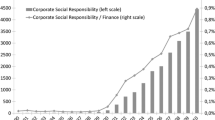Abstract
This paper explores the link between shareholder lawsuits brought under Rule 10b-5 of the Securities Exchange Act of 1934 and managerial disclosures of prospective information. When the manager's information is such that there is no affirmative duty to disclose under Rule 10b-5, previous research has shown that the manager will withhold his information if it is sufficiently unfavorable and will disclose it otherwise. When the manager's information is such that there exists an affirmative duty to disclose under Rule 10b-5, it is shown here that the manager will release either good news or news that is sufficiently bad. Further, the good news disclosures are expected to be more precise than those that reflect unfavorable information. It is also demonstrated that the probability of a disclosure will increase with both the precision of the manager's information and the variability of his firm's earnings.
Similar content being viewed by others
References
Bauman, J. (1979). “Rule lob-5 and the Corporation's Affirmative Duty to Disclose.” Georgetown Law Journal 67,935–990.
Cheng, P., and A. Dontoh. (1993). “Securities Litigation and Discretionary Information Disclosures.” Working paper, Purdue University.
Dye, R. (1985). “Disclosure of Nonproprietary Information.” Journal of Accounting Research23, 123–145.
Feltham, G., and I. Xie. (1992). “Voluntary Financial Disclosure in an Entry Game with Continua of Types:' Contemporary Accounting Research9,4680.
Francis, J., D. Philbrick, and K. Schipper. (1994a). “Shareholder Litigation and Corporate Disclosures.” Journal of Accounting Research32,137–164.
Francis, J., D. Philbrick, and K. Schipper. (1994b). “Earnings Surprise and Litigation Risk.” Working paper, University of Chicago.
Kasznik, R., and B. Lev. (1995). ''To Warn or Not to Warn: Managers' Dilemma Facing an Earnings Surprise:' The Accounting Review70,113–134.
Miller, M., and K. Rock. (1985). “Dividend Policy Under Asymmetric Information.” Journal of Finance40, 1031–1051.
O'Brien, V., and R. Hodges. (1991). A Study of Class Action Securities Fraud Cases.Berkeley: Law and Economics Consulting Group.
Skinner, D. (1994). “Why F is Voluntarily Disclose Bad News.” Journal of Accounting Research32,3840.
Sonsini, L., and D. Berger. (1993). Recent Developments Concerning the Disclosure Obligations of Issuers Under the Federal Securities Laws.Palo Alto: Wilson, Sonsini, Goodrich, & Rosati.
Trueman, B. (1986). “Why Do Managers Voluntarily Release Earnings Forecasts?" Journal of Accounting and Economics8,53–71.
Trueman, B. (1996). “Managerial Disclosures and Shareholder Litigation.” Working paper, University of California, Berkeley.
Wagenhofer, A. (1990). “Voluntary Disclosure with a Strategic Opponent.” Journal ofAccounting and Economics12,341–363.
Author information
Authors and Affiliations
Rights and permissions
About this article
Cite this article
Trueman, B. Managerial Disclosures and Shareholder Litigation. Review of Accounting Studies 2, 181–199 (1997). https://doi.org/10.1023/A:1018303309137
Issue Date:
DOI: https://doi.org/10.1023/A:1018303309137




